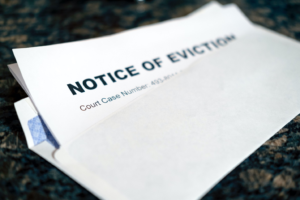The decision to evict a tenant is never easy for a landlord. However, in certain situations, it becomes necessary. Fortunately, the UK has several systems in place to start the tenant eviction process.
A quick online search will tell you that you need to serve your tenant a notice, either a section 21 or a section 8. But it can be complicated to figure out the difference between the two and decide which one will serve you best.
If you’re considering evicting your tenant, read on to find out the differences between the two:
1. When To Serve A Notice?
There are a few areas of overlap between the two notices. However, these are the basic uses of each section:
- A section 21 notice is served when you want to evict your tenant, even if they haven’t breached their contract.
- A section 8 notice is served when your tenant breaches the tenancy contract. One of the most common breaches in the UK is rent arrears.
2. Which One Makes An Eviction Easier?
With adequate representation and proper evidence, you should be able to get your tenant evicted regardless of which notice you serve. However, it is easier to get an eviction with section 21 than section 8.
This is because, with section 8, you need to present the court with your grounds for possession, stating the exact reason why you want to repossess your property. The tenants can then dispute against the reason and present their defence, which might extend their occupation of your property.
Additionally, you will need to present evidence that the tenant has breached the tenancy contract. Hence, you will have to collect several documents that you may or may not have access to. A single technical mistake can lead to you losing the case.
While there are some issues with a section 8 notice, a section 21 notice isn’t always bulletproof either.
3. The Section 21 Process
While a section 21 notice allows you to ask for repossession without any specific reason, you must be compliant with the section 21 legislation for your notice to be valid. For example, if you haven’t added the tenant’s deposit to the deposit scheme, the entire case could be thrown out.
The laws you need to comply with can change depending on:
- Your location (the UK and Wales have different rules)
- The date of the tenancy agreement
- The type of form you used
The details of the legislation can be found on this resource from the UK government. If all these details make you feel confused, then you may consult a tenant eviction company to build a solid case for you.
4. When Is A Section 8 Notice Better?
If you need to collect rent arrears, a section 8 notice will serve you better. Due to the impact of COVID-19, rent arrears have become a growing issue in the UK. While the tenant can dispute the eviction, the judge is more likely to award you the case if the reason behind the eviction is valid.
If you do not want to comply with the section 21 legislation laws, then a section 8 notice would serve you better.
Finally, you should use a section 8 notice if you want the tenant to evict the premises before their tenancy period is over. A section 21 notice is only valid after the tenancy period ends.
5. The Overlap
While section 8 is often associated with rent arrears, you can also use a section 21 notice for such a case. A section 21 notice would serve you better for debt repayment if your tenant’s notice period is close to ending.
This is because, unlike section 8, section 21 does not allow the tenant to dispute the repossession, and they will have to move out 2 months after the tenancy agreement ends. With a section 8 eviction notice, the tenant can use their defence to delay it.
Get Faster Tenant Eviction In The UK
The entire process can get quite lengthy and complicated, especially if you are a part-time landlord. A simple eviction can be delayed for months on several grounds. Our residential eviction specialists can help you get repossession of your property much quicker.
Take a look at our range of services to find out how we can assist you. We have used our expertise to help hundreds of landlords with their tenant woes.
Get in touch with us today to discuss your tenant eviction or debt recovery or landlords issues with one of our experts.










